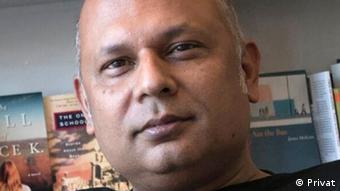In an interview with DW, Harris Khalique, secretary-general of the Human Rights Commission of Pakistan, said that PM Imran Khan's government is undermining the supremacy of parliament and democratic norms.
DW: Local and international media organizations are critical of Prime Minister Imran Khan's government's handling of the media and the freedom of the press situation in Pakistan. What is the Human Rights Commission of Pakistan's take on it?
Harris Khalique: Pakistan witnessed censorship and curbing of the freedom of expression during military dictatorships. However, such restrictions have never been experienced under a political government that claims to be democratically elected. Even if there are questions around the manipulation of the 2018 general elections, the current government can still be seen as a product of a continuous electoral process that was restored in 2008.
We believe that the muffling of critical voices and systematic suppression of political dissent under the incumbent government is incomparable with any elected government in the past.
How is the incumbent government muzzling the freedom of the press in Pakistan, and how is it different from the tactics used by previous administrations?
The current dispensation is not only constraining independent journalists, columnists and writers, it has also put a financial squeeze on media houses by various means. That has resulted in a number of publications going out of print and a large number of media professionals losing their jobs.
Interviews of opposition leaders are taken off air in the middle of the broadcasts, anchors on news channels are asked to comply with the official narrative, and op-ed writers are regularly censored. There have been multiple attempts to regulate social media with a view to eliminate any difference of opinion.
Are media owners also responsible for the plight of journalists in Pakistan?
There are two types of media owners in Pakistan. Those who fall in the first category are traditional media houses run by journalist-cum-owners. They have tried to put up with the pressure as much as they could.
The other category is large businesses that entered into media and journalism considering it a lucrative industry, which brings influence and political clout. Those belonging to the second category have been more ruthless when dealing with journalists. However, even those falling into the first category have placed their material interests before ethical journalism. Therefore, professional journalists and those who work in their supporting professions are the worst hit in this situation.
Sajid Hussain Baloch's death in Sweden has raised questions about the safety of Pakistani journalists abroad. Reporters Without Borders claims that Baloch's death is related to his work as a journalist. Do you agree?
The Human Rights Commission of Pakistan (HRCP) is deeply alarmed by the incident. There is certainly a possibility that Hussain lost his life due to his journalistic work focusing on Balochistan because the Pakistani state has dealt aggressively with those challenging its Balochistan policy. However, since Hussain was found dead in Sweden it is hard to make any conclusive remarks at this juncture until the time Swedish authorities complete their investigation into the matter.
HRCP has raised alarm about the threats to democracy in the country in its 2019 annual report. What are the major threats to democracy in Pakistan and how can its civil society deal with them?
There are a number of events that have taken place, and speeches made by those in power, which proved that Khan's government undermines the supremacy of parliament, ridicules democratic norms and questions provincial autonomy.
Pakistan cannot be at peace with itself without federalism and democracy and will never prosper without encouraging equal citizenship irrespective of class, faith or ethnicity. There is an inherent desire among the ruling elites – civil and military alike – to centralize power and to get rid of the 18th constitutional amendment that has empowered federating units, the provinces.
Both civil and political societies in Pakistan have a responsibility to safeguard the constitution, democracy, federalism, and supremacy of parliament by resisting any actions that will be detrimental to the country's integrity and security.


No comments:
Post a Comment